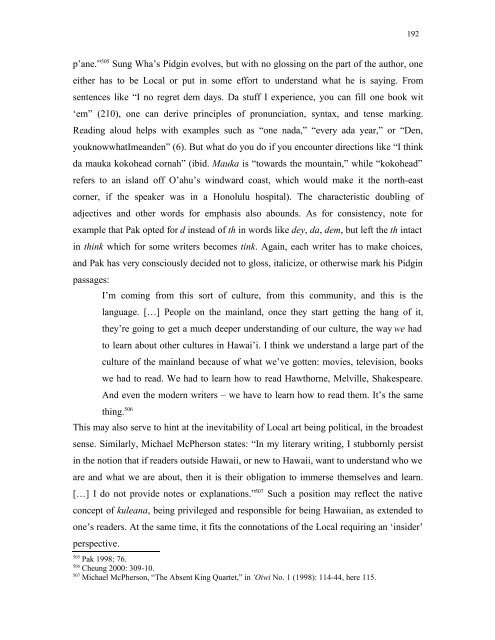A Paradise Lost - KOPS - Universität Konstanz
A Paradise Lost - KOPS - Universität Konstanz
A Paradise Lost - KOPS - Universität Konstanz
Create successful ePaper yourself
Turn your PDF publications into a flip-book with our unique Google optimized e-Paper software.
p’ane.” 505 Sung Wha’s Pidgin evolves, but with no glossing on the part of the author, one<br />
either has to be Local or put in some effort to understand what he is saying. From<br />
sentences like “I no regret dem days. Da stuff I experience, you can fill one book wit<br />
‘em” (210), one can derive principles of pronunciation, syntax, and tense marking.<br />
Reading aloud helps with examples such as “one nada,” “every ada year,” or “Den,<br />
youknowwhatImeanden” (6). But what do you do if you encounter directions like “I think<br />
da mauka kokohead cornah” (ibid. Mauka is “towards the mountain,” while “kokohead”<br />
refers to an island off O’ahu’s windward coast, which would make it the north-east<br />
corner, if the speaker was in a Honolulu hospital). The characteristic doubling of<br />
adjectives and other words for emphasis also abounds. As for consistency, note for<br />
example that Pak opted for d instead of th in words like dey, da, dem, but left the th intact<br />
in think which for some writers becomes tink. Again, each writer has to make choices,<br />
and Pak has very consciously decided not to gloss, italicize, or otherwise mark his Pidgin<br />
passages:<br />
I’m coming from this sort of culture, from this community, and this is the<br />
language. […] People on the mainland, once they start getting the hang of it,<br />
they’re going to get a much deeper understanding of our culture, the way we had<br />
to learn about other cultures in Hawai’i. I think we understand a large part of the<br />
culture of the mainland because of what we’ve gotten: movies, television, books<br />
we had to read. We had to learn how to read Hawthorne, Melville, Shakespeare.<br />
And even the modern writers – we have to learn how to read them. It’s the same<br />
thing. 506<br />
This may also serve to hint at the inevitability of Local art being political, in the broadest<br />
sense. Similarly, Michael McPherson states: “In my literary writing, I stubbornly persist<br />
in the notion that if readers outside Hawaii, or new to Hawaii, want to understand who we<br />
are and what we are about, then it is their obligation to immerse themselves and learn.<br />
[…] I do not provide notes or explanations.” 507 Such a position may reflect the native<br />
concept of kuleana, being privileged and responsible for being Hawaiian, as extended to<br />
one’s readers. At the same time, it fits the connotations of the Local requiring an ‘insider’<br />
perspective.<br />
505 Pak 1998: 76.<br />
506 Cheung 2000: 309-10.<br />
507 Michael McPherson, “The Absent King Quartet,” in ‘Oiwi No. 1 (1998): 114-44, here 115.<br />
192

















